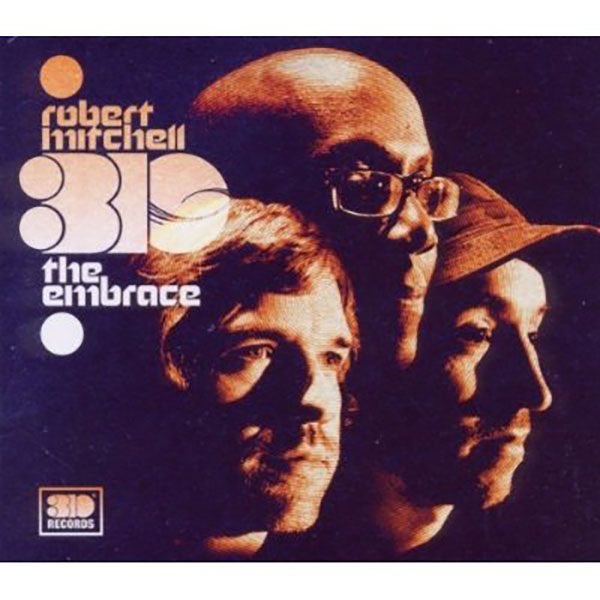
by Ian Mann
September 29, 2011
/ ALBUM
A genuine trio record with a high degree of group interaction. A worthy addition to Mitchell's admirably wide ranging catalogue.
Robert Mitchell 3io
“The Embrace”
(3io Records 3IOCD001)
Pianist and composer Robert Mitchell has been a significant presence on the UK jazz scene for a number of years and has recorded in a variety of contexts ranging from solo piano via a duo with violinist Omar Puente to his seven piece group Panacea. He has also been a prolific and productive sideman with Courtney Pine, Matana Roberts, Greg Osby, Steve Coleman, Dan Stern and others. However my favourite context for Mitchell’s playing remains his 3io with bassist Tom Mason and drummer Richard Spaven. The threesome’s début recording “The Greater Good” (2008) was Mitchell’s best album to date and remains a personal favourite. It was popular with other commentators too and garnered a number of awards. The trio’s immaculate performance at the 2009 Cheltenham Jazz Festival was one of that year’s live highlights.
“The Greater Good” is a tough act to follow and for me “The Embrace” just falls short of its illustrious predecessor. However it’s not for want of trying, Mitchell has again selected an inspired and eclectic collection of outside material to complement the compositions from within the group. Here tunes by Aphex Twin, Little Dragon and 4Hero rub shoulders with compositions by Bheki Mseleku and Robert Schumann, proof indeed that Mitchell refuses to be boxed in by genre. His adaptation of these tunes for the jazz piano format reveals considerable interpretative and arranging skills and follows on from the similarly eclectic “Greater Good” which featured Massive Attack’s “Teardrop” as an album centre piece.
The new album opens with Mason’s bass ushering in Aphex Twin’s “Alberto Balsam”. Once again it is Spaven’s mastery of contemporary grooves that helps to make material such as this convincing in an acoustic jazz context. The 3io have been performing together for ten years and there’s a commendable tightness and interdependency about their playing here and elsewhere. Spaven and Mason’s hypnotic grooves contrast well with Mitchell’s piano lyricism on this highly effective opener.
Mason’s “A Desperate Man” expands from his initial bass riff and retains the contemporary mood established by the opener. Mitchell’s playing is alternatively lyrical and feverish and the piece culminates in an exquisite bass and drum duet with Spaven carrying the melody with his pattering hand drums. Subverting the traditional melodic and rhythmic roles of the instruments in the trio is a favourite theme of Mitchell’s, it may not be strictly innovative but his group carry it off more successfully and take it further than most.
Swedish electronica group Little Dragon’s “Twice” is given an almost minimalist treatment with Mitchell emphasising the beauty of the original melody. Spaven’s ever evolving drum patterns provide wonderfully inspired and colourful punctuation.
The lead changes hands several times during the cover of 4Hero’s “Third Stream” with Spaven’s skittering groove and Mason’s virile bass leading things off before an increasingly exuberant Mitchell piano solo. There are plenty of interactive, rhythmically taut passages too on a track that represents something of a tour de force from the group and has been part of their live repertoire since the “Greater Good” days.
Mitchell’s title track is a tribute to his father and embraces African melodic and rhythmic patterns. These were inspired by the percussionist Nana Tsiboe with whom Mitchell has worked and studied. Mitchell, who is naturally left handed, has also explored the musical possibilities of reversing the traditional roles of the left and right hands at the piano keyboard and some evidence of that can be heard here. Mitchell’s melody overlaps (or embraces) Mason’s bass parts and thus the bassist is also heard to good effect here, including an early solo feature.
Spaven’s “Maz” was originally written for the drummer’s own quintet featuring singer Jose James. This presumably accounts for the melancholy, song like quality of the piece. The similarly lovely “Cycles” by the late South African pianist, saxophonist and composer pays tribute to a talented but often tragic figure. Mason’s wonderfully resonant bass solo and Mitchell’s own joyous playing represent the stand out moments of the piece.
Mitchell’s “A Tear (For Now)” is a beautiful and moving original ballad with Mason’s bass sometimes assuming a melodic role. “Rocker’s Round Window”, a piece by Spaven and his Dutch songwriting partner Vincent Helbers (they wrote the title track of the previous album) is less forceful than the title might suggest even though the piece is centred around Spaven’s colourful and inventive drumming.
Mitchell’s arrangement of classical composer Robert Schumann’s “Traumeri” (or “Dreams”) forms a brief, beautiful, almost hymnal coda to a fine album.
“The Embrace” is a consistently interesting and absorbing record with excellent contributions from all three protagonists. It’s very much a genuine trio record with a high degree of group interaction that sees all three musicians adopting the role of lead instrument at various times in addition to all being involved in the writing process. The standard of the playing is exemplary throughout, all three are excellent technicians.
If “The Embrace” has a fault it’s a lack of variety in mood and pace. Despite Spaven’s hip hop grooves and broken beats this is still thoughtful, almost cerebral, music and many of the pieces do tend to sound rather similar after a while. “The Greater Good” seemed to cover a wider variety of bases and hence still gets the nod. For all this “The Embrace” is still a worthy addition to Mitchell’s admirably wide ranging catalogue.
blog comments powered by Disqus